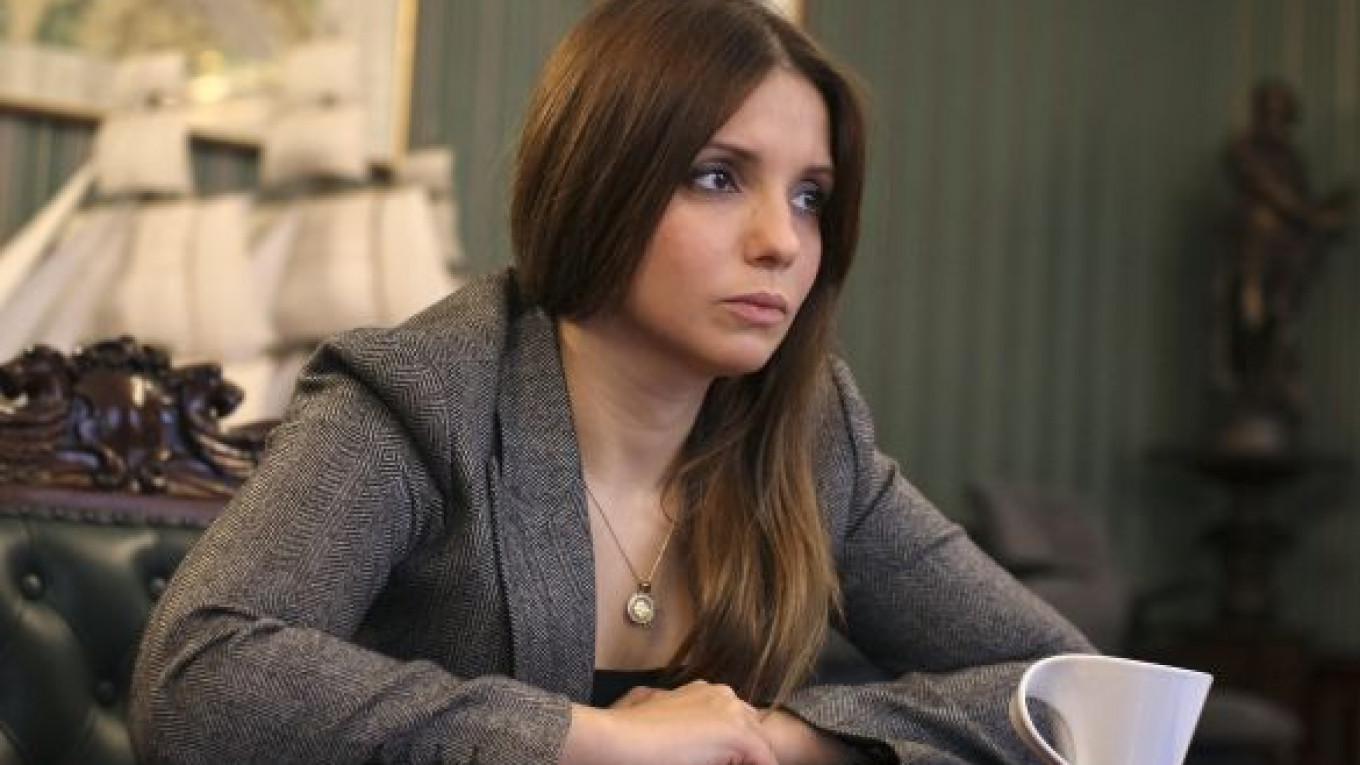KIEV — The daughter of Ukraine's jailed opposition leader Yulia Tymoshenko sees two years of pain and "psychological torture" ending for her mother if she goes to Germany for medical treatment by Nov. 19, under a deal being brokered by European envoys.
The release of Tymoshenko, jailed for seven years in 2011 after what the West said was a political trial, would likely clear the way for the ex-Soviet republic to sign landmark agreements with the European Union at the end of November.
Yevgenia, Tymoshenko's 33-year-old English-educated daughter, said in an interview that her mother was ready to compromise now so as not to jeopardize the signing in the Lithuanian capital Vilnius on Nov. 28.
"Her decision was mainly based on the fact that Ukraine is living through this historical time when Ukraine should decide, and must take the step of joining the European family. It was to make sure that the signing is not blocked or stalled because of her decision to stay," she said.
"It was very hard for her to make this decision [to leave] but she has now made the decision and now we are waiting for the decision from the president," Yevgenia said.
The likely option is for Tymoshenko to be freed to go to Germany for treatment at Berlin's Charite clinic, she said.
Her departure to Germany, assuming it comes, would mark the end of a battle of wills between President Viktor Yanukovych and Tymoshenko, his arch-rival whom he only narrowly defeated in a runoff for the presidency in February 2010.
Despite pressure from Western governments to end what they see as a flagrant case of selective justice, Yanukovych only indicated that he might free her after being warned a refusal would endanger key deals on association and free trade with the EU.
The agreements and the shift westwards could herald a historic break from dominance by Russia, and encourage foreign investment that would help Ukraine with its short-term debt repayment obligations.
Two European envoys, who have shuttled between Brussels and Kiev for a year and a half, have appealed to Yanukovych to pardon Tymoshenko to allow her to travel to EU member Germany for treatment for a chronic spinal condition.
While Yanukovych indicated Oct. 11 he would relent, he set no specific time and must solve the issue well before the Vilnius summit with the EU bloc. Technical details related to Tymoshenko's departure for Germany are being discussed, Yevgenia said.
But a new twist was added to the saga Friday, when Ukraine's parliament made public a draft law that would require Tymoshenko to return from Germany after medical treatment to complete her sentence. Her camp signaled that she may not agree to leave under such terms.
Previously, under a so-called partial pardon being worked out for her, Tymoshenko's seven-year sentence would be officially viewed as having been fully served and she would be freed.
That would ensure the criminal conviction would remain on her record, barring her from running for office for three years and rule her out of the February 2015 presidential election.
The European Court of Human Rights ruled Tymoshenko's pre-trial detention unlawful and Yevgenia hoped European courts would eventually overturn the original verdict.
EU ministers are expected to sign off on the pacts with Ukraine at a key Nov. 18 meeting — assuming Yanukovych frees Tymoshenko. "I hope on the Nov. 19 we can all be happy. This is the latest date for the authorities [to make their decision]," Yevgenia said.
Tymoshenko is under prison guard in a hospital in northern Ukraine where she is being treated by German doctors.
She was in considerable pain and cannot walk without help, Yevgenia said. "It continues to be psychological torture for her. … These two years have been so trying and difficult and torturing — we [her family] feel she will be re-born [when she is released]."
A Message from The Moscow Times:
Dear readers,
We are facing unprecedented challenges. Russia's Prosecutor General's Office has designated The Moscow Times as an "undesirable" organization, criminalizing our work and putting our staff at risk of prosecution. This follows our earlier unjust labeling as a "foreign agent."
These actions are direct attempts to silence independent journalism in Russia. The authorities claim our work "discredits the decisions of the Russian leadership." We see things differently: we strive to provide accurate, unbiased reporting on Russia.
We, the journalists of The Moscow Times, refuse to be silenced. But to continue our work, we need your help.
Your support, no matter how small, makes a world of difference. If you can, please support us monthly starting from just $2. It's quick to set up, and every contribution makes a significant impact.
By supporting The Moscow Times, you're defending open, independent journalism in the face of repression. Thank you for standing with us.
Remind me later.






